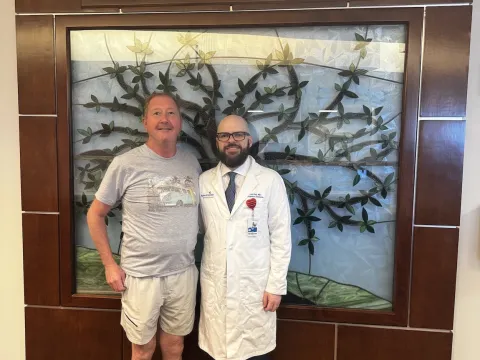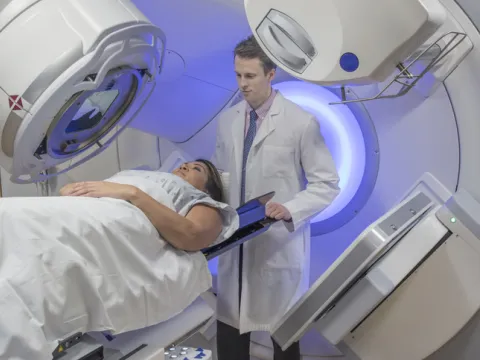- AdventHealth
Results using data from the Investigating Gains in Neurocognition in an Intervention Trial of Exercise (IGNITE) study were recently published in the peer-reviewed medical journal Age and Ageing, the official journal of the British Geriatrics Society. The study found that staying active through moderate-to-vigorous physical activity is associated with significantly better processing speed, working memory, and executive function in older adults.
Audrey Collins, PhD, formerly with the University of Pittsburgh and now a postdoctoral researcher with the AdventHealth Research Institute, contributed to the IGNITE study and co-first-authored the latest article with Maddison Mellow, PhD, from the University of South Australia. Results of IGNITE informed a second study now underway called the Follow-up Longitudinal Analysis of Moderate-intensity Exercise (FLAME), which is being led by AdventHealth Neuroscience Institute Director of Translational Neuroscience Kirk Erickson, PhD.
Key Findings of the IGNITE Study
A randomized, multi-site clinical trial, the IGNITE study tested a diverse sample of 648 adults between the ages of 65 and 80 and aimed to determine the influence of exercise on cognitive and brain health. In the current analysis using baseline data from the IGNITE study, the researchers examined associations between time spent in sleep, sedentary behavior, light physical activity, and moderate-to-vigorous physical activity across the 24-hour day, and cognitive performance.
Results found that when considering all lifestyle behaviors across the 24-hour day, higher amounts of moderate-to-vigorous physical activity were related to better cognitive performance, specifically processing speed, working memory, and executive function.
“Our results show that how we choose to spend our time across the 24-hour day may be differentially related to our brain health,” shares Dr. Collins. “We found that the need to prioritize physical activity, especially physical activity that gets our heart rates up, is key.”
Dr. Collins and her fellow researchers believe that understanding the interplay between different activities could empower older people to make positive health changes.
“With one in six people in the world expected to be 60 years or older by 2030, we need to make sure we are supporting and empowering people to age well,” comments Dr. Collins. “There are only 24 hours in a day, so every day, we make decisions about how we spend our time. If we sleep for eight hours, then there’s 16 hours remaining for waking behaviors like physical activity or sedentary behavior; that’s the basic reality. We hope that the knowledge gained through the IGNITE study is power: boost your physical activity and boost your brain health to stay fit and well as you age.”
Dr. Collins emphasizes that the current results are cross-sectional and need to be tested longitudinally and experimentally.
The FLAME Study – Further Exploration of the Relationship Between Moderate-Intensity Exercise and Brain Health in Older Adults
To test the long-term effects of IGNITE, the AdventHealth Neuroscience Institute is currently conducting the FLAME study, a national multisite effort funded with $11 million from the National Institutes of Health (NIH). Under the leadership of Dr. Erickson, this follow-up study is examining whether participation in moderate-intensity exercise interventions influences the rate of cognitive performance changes and risk for Alzheimer’s disease pathology five years later. The FLAME study is currently enrolling participants from the IGNITE study. It will also explore the extent to which those individuals maintain the exercise routines they started in IGNITE and determine whether there are any factors predicting long-term adherence to exercise behaviors.
The AdventHealth research team hopes to use the combined findings of IGNITE and FLAME to help inform future research and dementia prevention guidelines for all lifestyle behaviors across the 24-hour activity cycle continuum.
Learn more about the AdventHealth Neuroscience Institute here.
Recent News

AdventHealth Cancer Institute Advances the Use of CAR T-Cell Therapy for Multiple Myeloma
CAR-T therapies have emerged as new treatment options for certain types of cancer through a one-time infusion that can lead to long-lasting remission.

AdventHealth Graduate Medical Education Program Celebrates 50 Years
Growing from a family practice residency to 24 accredited programs, AdventHealth’s Graduate Medical Education (GME) program celebrates 50 years.

New Clinical Trial Explores Digital Intervention for Apathy in Late-life Depression
Afflicting 30-50% of patients with late-life depression, apathy is a challenging psychiatric syndrome in older adulthood that can result in lack of motivation leading to poor self-care, physical...

AdventHealth Performs Central Florida’s First Liver Transplant for Unresectable Colorectal Liver Metastases
In June 2025, AdventHealth Abdominal Transplant Surgeon and Surgical Oncologist Ryan Day, MD, worked with a multidisciplinary team to perform Central Florida’s first liver transplant for unresectable...

AdventHealth Neuroscience Institute First in Florida to be Recognized as a GammaTile Center of Excellence
GammaTile is the first and only tile-based radiation therapy for the treatment of
operable brain tumors. The AdventHealth Neuroscience Institute began performing GammaTile procedures in 2021 and was...

An AdventHealth Collaboration Explores the Impact of Microgravity and Electrical Stimulation on Muscle Cell Health in Space
Using a muscle lab-on-chip model aboard the International Space Station (ISS), AdventHealth Translational Research Institute’s Dr. Paul Coen has been working with a multidisciplinary team from the...

AdventHealth Neuroscience Institute Among First in U.S. to Offer Phase IIa Clinical Trial of Troculeucel for Moderate Alzheimer’s Disease
While most clinical trials for Alzheimer’s disease have focused on patients with early or mild cognitive impairment, roughly 30% of those with Alzheimer’s have moderate stage disease for which there...

AdventHealth Translational Research Institute Selected as Clinical Site for National Study of Muscle, Mobility and Aging (SOMMA)
Under the leadership of Scientific Director and Principal Investigator Bret H. Goodpaster, PhD, the AdventHealth Translational Research Institute (TRI) is now enrolling men and women 70 years of age...

AdventHealth Participating in Phase I Clinical Trial of Potential New Oral Immunotherapy Treatment for Mild to Moderate Ulcerative Colitis
AdventHealth Research Institute is the first in Central Florida to participate in the expansion phase of a clinical trial exploring a potential new oral immunotherapy treatment for mild to moderate...

AdventHealth Neuroscience Institute Administers First Dose of Investigative NK Cell Therapy to Person with Alzheimer’s Disease
Under a single compassionate use Investigational New Drug (IND) authorization cleared by the U.S. Food and Drug Administration (FDA), the AdventHealth Neuroscience Institute worked with NKGen Biotech...

New Study Published in the New England Journal of Medicine Shows the Addition of Regional Nodal Irradiation Does Not Decrease Rate of Invasive Breast Cancer Recurrence in Patients with Negative Axillary Nodes Following Neoadjuvant Chemotherapy
Findings of the phase III, multicenter, randomized NSABP B-51-RTOG 1304 clinical trial were recently published in the New England Journal of Medicine with AdventHealth Cancer Institute’s Dr. Mamounas...

AdventHealth Study Exploring the Use of MR-Guided Focused Ultrasound (MRgFUS) to Disrupt the Blood-Brain Barrier for Treatment of Alzheimer’s Disease
Under the leadership of Dr. Valeria Baldivieso and Dr. Chandan Reddy, the AdventHealth Research Institute is the first and only site in Orlando offering the Exablate Blood-Brain Barrier (BBB)...
